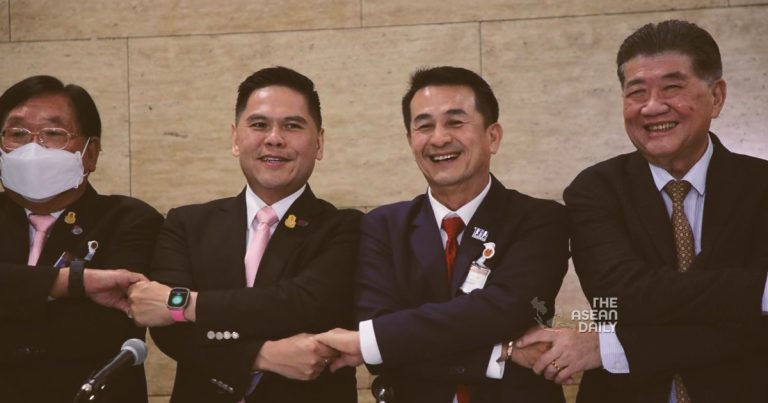13-8-2023 (BANGKOK) The Pheu Thai Party is facing severe criticism for its decision to bring the so-called “uncle parties” into its coalition, with critics accusing the party of betraying the people’s trust. They argue that the composition of the Pheu Thai-led coalition government will bear a striking resemblance to the outgoing government, as only Pheu Thai will be a new addition.
Pheu Thai’s move has drawn heavy criticism due to its prior assurance before the May 14 election that it would not collaborate with the “uncle” parties, referring to those associated with military leaders involved in the 2014 coup. The term “uncles” specifically refers to Prime Minister Prayut Chan-o-cha, the former chief adviser of the United Thai Nation Party (UTN), and Deputy Prime Minister Prawit Wongsuwon, the leader and prime ministerial candidate of the Palang Pracharath Party (PPRP).
According to an insider, Pheu Thai has struck a deal with the PPRP, wherein the PPRP has agreed to support Pheu Thai’s prime ministerial candidate in exchange for a share of the cabinet quota. However, the UTN’s participation in the coalition is yet to be confirmed. If the UTN also decides to join, the Pheu Thai-led coalition will have a total of 315 Members of Parliament (MPs), the source revealed.
As of now, Pheu Thai has 141 MPs, while Bhumjaithai has 71 MPs, the PPRP has 40 MPs, the UTN has 36 MPs, Chartthaipattana has 10 MPs, Prachachat has 9 MPs, Pheu Thai Ruam Palang has 2 MPs, Chartpattanakla has 2 MPs, and the Seri Ruam Thai Party, Plung Sungkom Mai, Thongthee Thai, and the New Democracy Party each have one MP.
Wanwichit Boonprong, a political science lecturer at Rangsit University, expressed concern over the collaboration between the PPRP and the UTN, emphasizing that they are old rivals of Pheu Thai. He stated that if they join forces, people may suspect that it is solely for their own interests, regardless of their supporters’ opinions. He also pointed out that the two parties would likely seek a share in economic decision-making, making it challenging for Pheu Thai to implement its policies effectively. Wanwichit further predicted that Pheu Thai’s decision to include the uncle parties in the coalition might result in a decline in votes for the party in the next election.
Olarn Thinbangtieo, a political science lecturer at Burapha University, echoed similar sentiments, highlighting that Pheu Thai had previously pledged not to collaborate with the UTN and the PPRP. Going back on this promise could lead to public demonstrations, potentially impacting the economy.
Wiroj Lakkhanaadisorn, a list-MP from the Move Forward Party (MFP), took to Twitter, stating that if the UTN and PPRP join the Pheu-Thai led coalition, the configuration will be no different from the outgoing government. He further criticized the move, claiming that another party’s inclusion only serves to support a dictatorship, seemingly referring to Pheu Thai.
Amarat Chokepamitkul, a prominent figure in the MFP, expressed a similar sentiment on Facebook, asserting that the people will not witness any substantial change in the government. According to him, it will essentially be the same as the previous government, with Pheu Thai now becoming a part of it.
Red-shirt activist Ekachai Hongkangwan urged Pheu Thai not to betray their red-shirt supporters by collaborating with parties that endorse a dictatorship. Sombat Thongyoi, former chief of the red-shirt guards, also voiced his opinion on Facebook, claiming that no matter how much the red-shirt groups protest, it won’t prevent Pheu Thai from forming a coalition government with the PPRP and UTN.
In the midst of these developments, Pol Maj Gen Jirasant Kaewsaeng-ek, deputy commissioner of the Metropolitan Police Bureau (MPB), issued a warning to road users to avoid the upcoming “car mob” rally on Sunday. The rally will involve a convoy of cars starting from BTS Mor Chit station and progressing to the headquarters of the Bhumjaithai Party and Pheu Thai, he cautioned.




